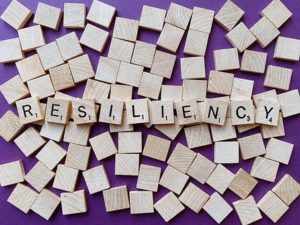This article originally appeared at the Globe and Mail – see original version here (for subscribers only).
Exhausted. Overwhelmed. Flat. Emotional. Hopeful. Cautiously optimistic.
These are just a few of the words voiced by many of my coaching clients and workshop participants in recent months when I have asked the loaded question: “How are you? No really, how are you?”
It’s normal to experience seasonal winter blahs. But add in two years of restrictive pandemic life and then a whole swath of more challenges – floods, fires, wars, chaos, globally and on our own streets – that’s a different story. Our resilience has been tested, stretched and tested again.
Thankfully, there are glimmers of hope and reason for cautious optimism, at least on the pandemic front. With a new season ahead and a reopening on many fronts, there just might be some better days ahead. Fingers crossed. Toes too, right?
But we’d be wise to stay on our toes with our resilience efforts because we’re not going back to the same version of normal we once knew. While we will resume some sense of normalcy and activities we so dearly missed, there will always be a degree of flux and uncertainty in our lives and work experience.
Resilience is the fuel of the future
If resilience was a stock, its valuation is massively on the rise. It will never go out of favour. We would all do well by investing in it. It’s the fuel of the future and in play right now.
It will be crucial to forge ahead in careers, leadership and the business of work. A silver lining from these past two years is an immense awakening to the resilience challenge; how vulnerable we can be, and yet also have agency in keeping our tanks filled, and in supporting others.
We still have a ways to go, but I predict resilience as a crucial skill will continue to take root in the year ahead as an essential priority for work, leadership and the continuum of professional and personal growth.
It has a great business case, too, because it’s for everyone, everywhere. No one is immune from the wear and tear of disruptive, challenging times. Even our famous Olympians, tennis and hockey stars have publicly shared their humanity and faltering moments when their mental health and resilience tanks were running low. No matter how accomplished, driven and capable – depletion can hit us all.
The paradox is that resilience can deplete, but it can also renew. We just need to pay more attention, because what worked before may not be enough for current and future times of flux. This is true for individuals, teams and organizations.
On a positive note, people and organizations are taking notice. Individually, they are meditating, practising self-care and self-compassion, discovering the healing power of nature with even a short walk outside (kudos to one of my clients who gets out daily even in -40 degrees).
On the leadership front, I have daily conversations with leaders who are reaching out to have more human connection with their people despite the challenges of physical distancing. They are caring more, listening better and creating safe climates for their people to speak up about their fears and struggles. Not only is the work getting done but trust is being built in these difficult times.
A great start. But leaders are also faltering and trying to find their footing in these wearing days.
So what else? How else? Who else?
We’ve got a lot more work ahead.
What else can we do? Individually, and collectively?
What tiny moves might have big, positive impacts? On ourselves and on others?
What can we control? What must we let go of and/or be more flexible around?
Resilience is both an individual and a team sport
Each person must take personal responsibility for themselves and there is much that can be done at the leadership and organizational level, too. We are social beings. Every action, inaction, word or silence can have profound impact on other’s experience and resiliency.
So, how to move forward? Resilience is not one thing, one strategy or one path. It’s many. We must attend to mental, social, emotional, physical and spiritual well-being to fuel up and protect our resilience tanks. And we need to rethink some of our old ways of leading, of working and of growing ourselves.
In upcoming columns I’ll share resilience paths and principles that can be helpful touchpoints and a compass for action. I’ll also write about leading, working and living in times of flux, challenge and opportunity.
But for now, a few questions to reflect and act on:
1. What is at least one tiny thing I can do to protect and boost my resilience?
2. How can I be more sensitive and supportive of others in my work (and life) experience? What is my impact? What can I do to have positive influence?
Eileen Chadnick, PCC, ACPC of Big Cheese Coaching, is an ICF credentialed executive coach, team coach, workshop facilitator, and writer specializing in career navigation, executive and leadership development, culture-building, and communications. Principal of Big Cheese Coaching and Chadnick Communications in Toronto, Eileen is also a faculty member of the Business Coaching Advantage Program™ at People Dynamics Learning Group Inc. She draws from the disciplines of emotional intelligence, positivity – and Conversational Intelligence®(C‐IQ®) in her work. She is author of the book, Ease: Manage Overwhelm in Times of Crazy Busy. See more at www.bigcheesecoaching.com


0 Comments